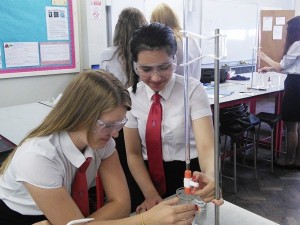McAuley Sixth Form » Subjects » Chemistry
Chemistry
New Specification What does this mean?
 Chemistry Experiments.
Chemistry Experiments.
Why choose AQA A Level Chemistry?
Chemistry helps us to understand the world in which we live and underpins a wide range of science-based degree courses and careers. Success with A level chemistry will prepare you for a future in chemistry, pharmacy, pharmacology, chemical engineering, biochemistry, biomedical sciences, medicine and dentistry. The AQA A-level course is a fascinating exploration of atomic structure, chemical bonding, and reactions of organic and inorganic chemicals and builds upon knowledge and understanding from the AQA GCSE chemistry course that our students study in Y11. The course content develops the foundations of chemistry before branching out into the 3 disciplines of organic, physical and inorganic chemistry. Specific topics include biochemistry, kinetics, equilibria and energetics. This course will also develop your problem solving, teamwork, numeracy, communication and practical skills, as well as hugely valuable independent study and reasoning skills.
Back to topWhat will I learn in A Level Chemistry and how will it be assessed?
Physical Chemistry
- Atomic structure
- Amount of substance
- Bonding
- Energetics
- Kinetics & rate equations
- Chemical equilibria and equilibrium constants
- Oxidation, reduction and redox equations
- Thermodynamics
- Electrode potentials and electrochemical cells
- Acids & bases
Inorganic Chemistry
- Periodicity
- Group 2, the alkaline earth metals
- Group 7, the halogens
- Properties of period 3 elements and their oxides
- Transition metals
- Reactions of ions in aqueous solution
Organic Chemistry
- Introduction to organic chemistry
- Alkanes
- Halogenoalkanes
- Alkenes
- Alcohols
- Organic analysis
- Aldehydes & ketones
- Carboxylic acids & derivatives
- Aromatic chemistry
- Amines
- Amino acids, proteins & DNA
- Organic synthesis
ASSESSMENT
all external assessment is carried out at the end of the course
Paper 1
Content
- Inorganic chemistry, with relevant physical chemistry
- Relevant practical skills
Assessment
- Written exam: 2 hours
- 105 marks
- 35% of full A-level
Questions
- 105 marks: a mixture of short and long answer questions
Paper 2
Content
- Organic chemistry, with relevant physical chemistry
- Relevant practical skills
Assessment
- Written exam: 2 hours
- 105 marks
- 35% of full A-level
Questions
- 105 marks: a mixture of short and long answer questions
Paper 3
Content
- Any content
- Any practical skills
Assessment
- Written exam: 2 hours
- 90 marks
- 30% of full A-level
Questions
- 40 marks: practical techniques and data analysis
- 20 marks: testing knowledge and understanding across the specification
- 30 marks: multiple choice questions
How will I learn?
You will learn through opportunities to:
- Take part in practical investigations
- Discuss your work in pairs and groups
- Make presentations to the class
- Through the use of online platforms & digital resources
- Work independently on written tasks
- Carry out research and work on group or individual projects
- Take part in visits and workshops at nearby universities
- Take part in national competitions (the chemistry Olympiad)
Related Degrees
Alternative energies, Biochemistry, Cosmetics, Dentistry, Environmental, Forensics, Geology, Healthcare, Industrial chemistry, Journalism, Law, Medicine, Nanotechnology, Oceanography, Pharmaceutical, Quantum physics, Research, Sports science, Toxicology, Veterinary medicine, Weather science, Zoology……………The list is endless!
Chemistry can provide access to ANY degree course. It requires students to display the full range of key skills and is highly regarded by Universities and employers for its academic rigour.
Back to topRelated Careers
Essential for Medicine, Dentistry and Veterinary Medicine. Recommended for all science based careers. Chemistry can also lead to a wide variety of non-scientific careers including law (in particular patent law), management, finance and business – even Prime Minister!
Back to topFurther Course Information
Students will receive textbooks, revision guides and past papers. A refundable £10 deposit is required. Students would benefit from reading related publications such as New Scientist, Chemistry Review, BBC Focus and from joining the (free) RSC Chemnet learning network.
Back to topExtracurricular
Visits to Universities to take part in workshops and use their laboratory facilities.
Opportunity to compete in national competitions such as the Chemistry Olympiad and schools' analyst competition.
After-school or lunchtime learning support surgeries.
Invitations to attend careers events online or in person.
Back to top